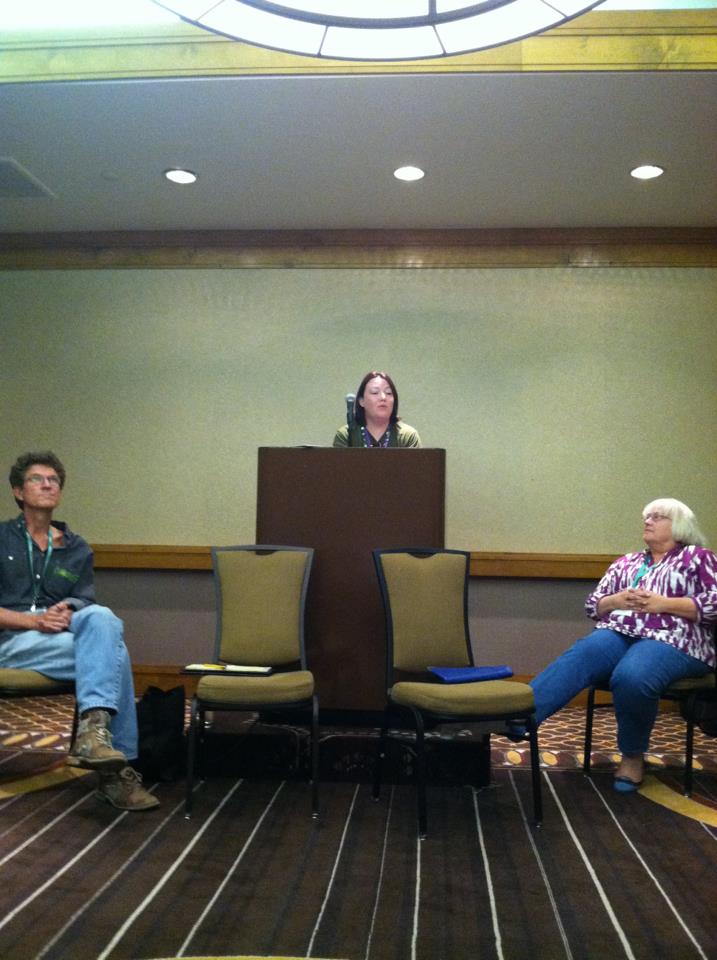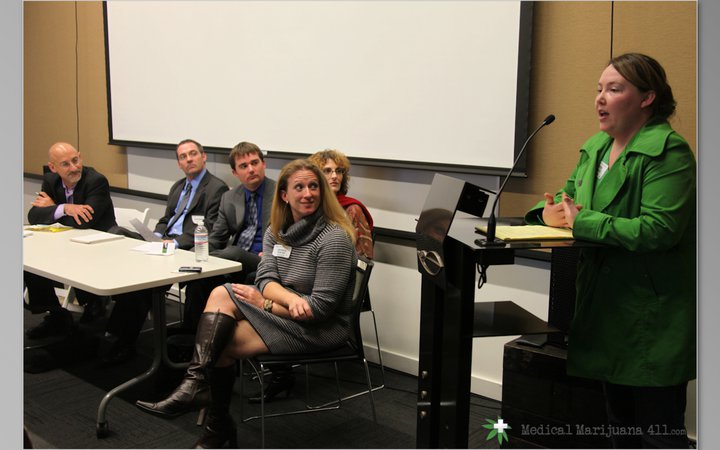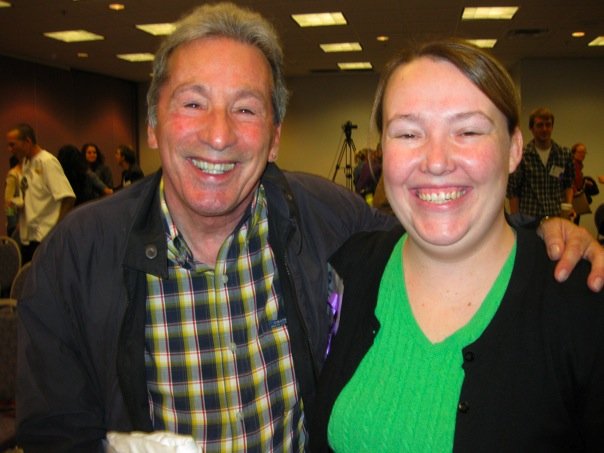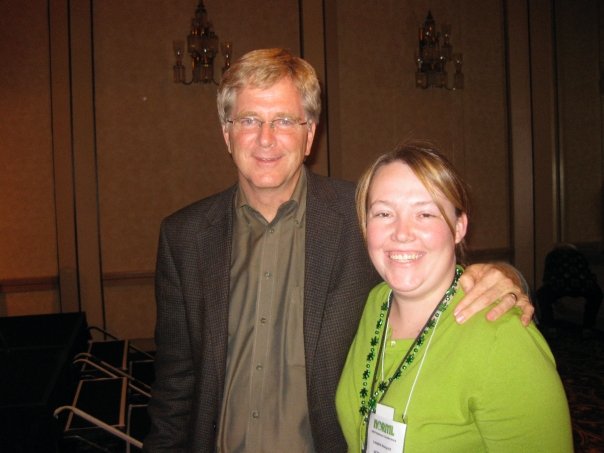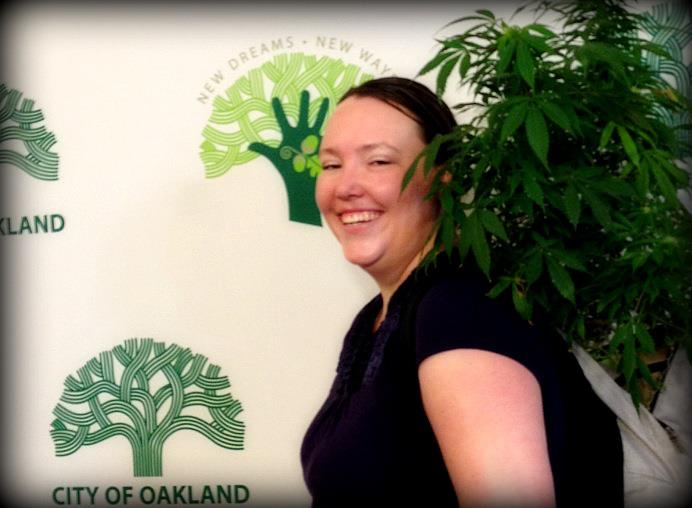Weedists: Meet Lauren Vazquez
“Weedists are the people who are out there fighting the good fight and these are their stories.”
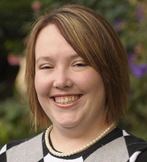 Lauren Vazquez is the Fired Up Lawyer, and it’s easy to see when you meet her. Her enthusiasm for her work and her joie de vivre light up the room. When I met her at the 2007 NORML conference, she was already a rising star in the cannabis community. I don’t remember a lot about that meeting except Lauren’s great vibe, a fun visit, a lot of giggling and a rejuvenation of my own commitment to the movement.
Lauren Vazquez is the Fired Up Lawyer, and it’s easy to see when you meet her. Her enthusiasm for her work and her joie de vivre light up the room. When I met her at the 2007 NORML conference, she was already a rising star in the cannabis community. I don’t remember a lot about that meeting except Lauren’s great vibe, a fun visit, a lot of giggling and a rejuvenation of my own commitment to the movement.
In 2004, Lauren revived the UC Santa Barbara NORML chapter. The chapter quickly grew to become one of the most popular campus organizations and most active chapters of NORML. Within two years of forming, the group succeeded in passing Measure P, Santa Barbara’s Lowest Police Priority Ordinance. In 2006, NORML named Lauren Student Activist of the Year. She has been working for almost a decade to end cannabis prohibition.
She continued her activism efforts as President of the SCU Law chapter of the ACLU and co-chair of the Public Interest Social Justice Coalition. The law school recognized her dedication to civil rights with many honors including the 2008 Social Justice Service Award.
After law school, Lauren joined patients and activists to form the Silicon Valley Americans for Safe Access (ASA) Chapter. She also became an associate with medical cannabis attorney James Anthony. While working with Mr. Anthony, Lauren became a legal researcher and political strategist for the medical cannabis consulting firm CannBe. In January 2011, Lauren started her own law practice as The Fired Up Lawyer
Lauren is a civil rights attorney who works with individuals and organizations across California. Her practice includes business law, civil litigation, and discrimination cases. Her law practice focuses on the medical cannabis community. She provides advice and legal services to advocacy groups, collectives, cooperatives, vendors, and cultivators. She is an industry leader with a reputation for quality service and fair rates.
Currently, Lauren serves as the Founder and Director of the SPARC Legal Clinic in San Francisco. This clinic provides free legal advice to patients. She was also instrumental in the organization of patients and the community to support Oaksterdam University and Harborside Health Center during the recent federal crackdown in California.
She remains one of my favorite activists, and I am excited that she made time to answer my questions to share with all of you exactly what makes her a Weedist Woman.
I noticed your activism around 2004, when you restarted the very successful UC Santa Barbara NORML chapter. What motivated you to get involved in the cannabis movement, especially as a law student?
I was motivated to get involved by those horrible TV ads that the ONDCP ran where teens did really stupid things on pot. Remember that ad with the kid playing in his dad’s office with the gun and shoots his friend? The most offensive was the date rape ad implying that girls who use pot will be raped. At the time, I had recently quit drinking because it caused me to get into dangerous situations. I chose pot because it is safe, and I did not make the mistakes I made on alcohol. So, the ad made me fired up because it was sending the opposite, more dangerous message. I had also read The Emperor Wears No Clothes and Drug Crazy, which provided the foundation I needed to know the truth about cannabis and the drug war. I was an undergrad when I started NORML and got involved. During law school I studied drug law and volunteered with Americans for Safe Access and the ACLU. It was easy to incorporate cannabis activism as a law student, especially since that is what I was in law school to do.
In 2006, NORML noticed that activism and honored you with their NORML Student Activism Award. Looking back, how do you think that shaped your path?
I was very lucky to be honored early on by NORML. At the time, pot legalization was not all the rage it is now. It was very stigmatized, and it was not easy to be “out” as a pot user and activist. People would make fun of you or assume you are a lazy criminal. As an undergrad, I was working very hard to get into law school. It was a big risk to focus all my extracurricular activities on cannabis reform instead of joining more established and less controversial student groups. The award helped me know I made the right choice. It also brought me credibility and elevated my profile as a cannabis reformer.
“Fired Up Lawyer” is such a perfect name for your practice! In addition to the work you do to help members of the medical cannabis community, what other civil rights issues are your passions?
Women’s rights are currently my other passion. I never realized how people treated me differently because of my gender until I became a lawyer. Before I would attribute certain treatment to my status as a student or young person. After I became a lawyer and was not so young anymore, I boiled it down to my gender. At one point, I was paid nearly ten times LESS than a man with fewer credentials and experience. Now, I see it everywhere, especially in advertising and politics. Women are under attack from all fronts. We are constantly having to defend and prove ourselves. In 2016, I would not only hope to have cannabis legalization but also the first female president!
I think we can agree that cannabis prohibition is in its last gasps. How do you think it’s going to go down in California?
In California, we are fighting cannabis prohibition on all fronts. We are currently working to get the legislature to establish statewide guidelines for the medical cannabis industry. Too many cities ban storefront collectives and leave patients without any safe access. The city by city approach did not work. We need state level regulations to protect patients. At the legislature, we are going to present a proposed bill to end cannabis prohibition for all adults. If the legislature does not support it, we will put it on the ballot. Outreach and education to many different groups is the current priority. The more people that learn the truth about cannabis and the harm of prohibition, the more l support we will garner for cannabis legalization and ending the drug war completely. Our country needs to develop a health based approach rather than a punitive approach to drug reform. People need to learn that drug prohibition is code for people persecution. Then, they will never again let politicians use fear to get elected and mass incarcerate our country.
What would you say to young women who are just starting college and want to get involved?
Educate yourself about drug policy. Go online to the various organization websites and get to know the facts and solutions for the drug war. Find the people in your community working on drug policy reform and join them. Look on campus first for a SSDP or NORML chapter. If there are no chapters, reach out to other student groups to see if they have any members interested in drug policy reform. It may be possible to join with them and bring this issue into their work. For example, you could propose and help the campus Democrats chapter do a legalization event on 4/20 week. Also, reach out to professors who are in the social sciences. They may be active in civil rights or drug policy reform in the larger community and can help you get involved. Consider starting a new group. I suggest SSDP because of the strong network and support base the organization provides its chapters. That is the organization’s entire purpose and student groups need all the help they can get. If you cannot connect with existing groups or people on campus, or starting a new group is not for you, then look off campus for opportunities. There may be internships that involve drug policy reform work such as the public defender’s office. Community groups and nonprofits may also be working on drug policy reform and you can join with them. And there are always Twitter and Facebook to connect to the reform movement.
What are you working on now, and what’s coming up for you?
I am currently planning my wedding, running my Fired Up Lawyer practice, launching my new business Surefire Legal and volunteering with the Coalition for Cannabis Policy Reform (CCPR), a broad based coalition of the national drug policy groups and grassroots activists working to change California drug laws. So, I am very busy, but having fun. In my law practice as the Fired Up Lawyer, I advise people who are starting or running a medical cannabis business in California. I provide consultations and help people get set up and properly operate their business. My new business, Surefire Legal is similar except we set up non-pot businesses. It is online based and similar to online do-it-yourself services except we provide actual lawyers and legal advice. We launched in March and are currently serving the Bay Area. We will eventually expand to the rest of California.
The CCPR is the most exciting work I am doing because this is where the rubber has hit the road. No more philosophizing about legalization, we are actually doing it. I am serving on the strategy, outreach and legal drafting committees. For strategy, I have been using all of my organizing experience to help draft strategic plans and white papers. We are combining a grassroots force with a grasstops organization. It is really a powerful group, but it needs direction. For outreach, I am working with California NAACP director Alice Huffman to do minority outreach. This is a critical aspect of the work we do. I am honored to be working with such an accomplished and respectable leader as Alice and the NAACP.
It’s a funny thing when people ask, “When are they going to legalize?” I always respond, “They are not going to legalize anything. We are the ones who have to do it.” And that is what the CCPR is doing.
When I sit in my office on conference calls discussing messaging and drafting proposals for the bill, I think I am legalizing! This is what it looks like. These are the nuts and bolts. Meetings, emails, tweets, phone calls — this is what it takes. It does not take some cosmic shift to change the world, just hard-working people dedicated to the cause willing to stand up for what is right and make it happen. I love it! I will be with the campaign until victory day. Then, I will keep working to reform the rest of our drug policies.









